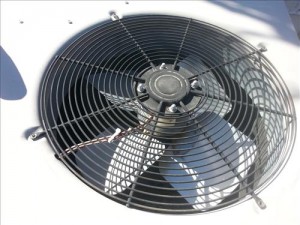
A condensing fan motor is an important component of an air conditioner or heat pump unit.
It is a component that turns on and off frequently and moves air away from the condenser.
What Is a Normal Temperature for a Condensing Fan Motor?
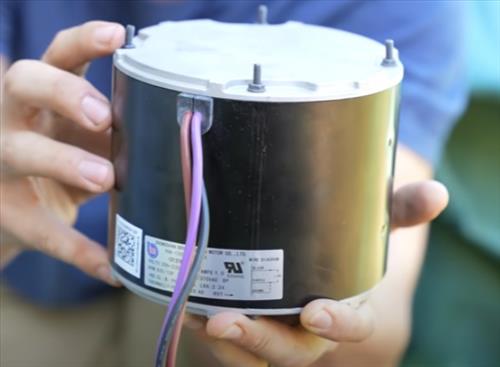
A Condensing fan motor usually operates at a temperature of roughly 150 degrees Fahrenheit.
Condensing motors can vary in build, but most should not get over 170-190 degrees Fahrenheit.
Check the manual for the unit to see what the normal operating temperature is for the motor.
The Condensing fan motor should never be overheating, whether it be a heat pump, air conditioner, or split system.
The motor temperature can be measured with a thermometer.
HVAC technicians often use infrared temperature guns to read the temperature without ever touching the condensing fan motor, but a standard thermometer will also work.
Every condensing fan motor has a temperature it can safely operate at. This operating temperature is usually labeled on the side of the motor tag, which also has all the information about the motor.
Most motors run around 70 degrees Celsius or 150 degrees Fahrenheit.
Sometimes the name tag can be easily seen, and sometimes it will have to be lifted out to see. Lifting out a motor is easy as they are usually mounted to a circular grate that has 6-10 screws holding it in place.
What Causes a Condenser Fan Motor to Overheat?
- Bad Motor
- Bad Start Run Capacitor
- Incorrectly Sized Motor
- Over-amping
- Fan Blade Positioned Wrong
- Poor airflow
The most common cause of a condensing fan motor overheating is a bad motor or bad start run capacitor.
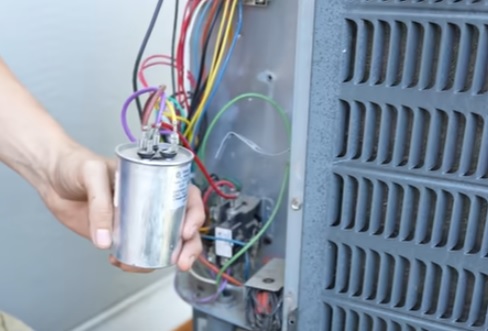
A motor that is over-amping usually has a bad start run capacitor.
A fan blade installed wrong with the wrong depth or the blades are backward can also cause overheating.
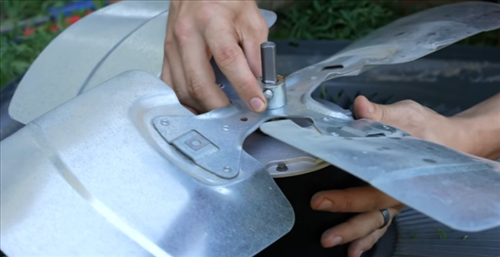
Before removing a bad motor, be sure to note the depth the blades are at in the unit so they can be positioned correctly when the new unit is installed.
Also, before working on a unit, be sure it is off when removing any screws. HVAC technicians pull the disconnect or turn the power off at the breaker to the unit before doing any work. No one wants a unit to kick on, spinning the blades while they are working on it.
How to Check why a Condensing Fan Motor is Overheating?
If the temperature is too high, the motor may be bad, or something is causing it to over-amp. The usual cause of an over-amping condensing fan motor is when it has a failed start run capacitor or wrong fan blade position. If no work has been done to it lately, most likely the start run capacitor has failed or the motor has gone bad.
If the unit has been worked on recently, check the fan blades are positioned correctly.
The fan blades should not be backward and should be at the right depth.
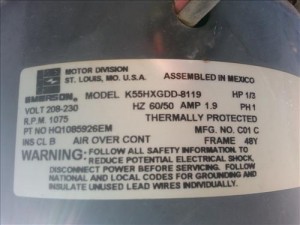
Replacing a condensing fan motor is fairly simple and can save you a lot of money for the DIY (Do it yourself) type of person. An HVAC company will charge roughly 400-500 dollars, maybe more, to come out and fix it for you. While buying a new motor yourself costs roughly 60-150 dollars.
Of course, care has to be taken; if a motor or start run capacitor is wired wrong, then it can burn up a motor and cost more money. If you have wired up a wall socket, roof fan, or other electrical household items, more than likely, it will not be a difficult job.
There are many YouTube videos and books that can show the necessary steps.
Replacing the start run capacitor should also be done at the same time. Using the old start run capacitor with a new motor can damage a new motor.
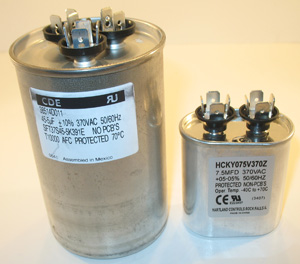
The information needed for buying a new motor and capacitor is written on the side of each.
The problem for many DIYers is that places like Home Depot or any home supply store do not carry these parts. Finding an HVAC service company that will sell you the parts is an option, but they usually mark up the prices when they sell to a homeowner. The good news is that these parts can be easily ordered online at Amazon or eBay.
The same can be done with the start run capacitor by looking at the tag for the MFD and voltage.
For all the Do-it-yourself home people out there, replacing a condensing fan motor and start run capacitor will be a great way to save money.
Of course, if in doubt, be sure to call a professional.
I got a situation whereby a outdoor fan motor of 12000btu LG is heating up and stop after running for about 20mins,i have replaced with a new one but still does the same.
Sounds like the Start/Run Capacitor needs replaced.
I’m currently working on a window AC . The fan speed is very slow. It will change speeds but the high is similar to low and medium is even slower and low is very slow.
I thought it may be the fan capacitor or the run capacitor. Everything else is working fine. My main goal is to get the speeds working normal to the proper settings.
It sounds like the motor is going bad but would need some test to be sure. Do you have a HVAC Multi Meter that can test the capacitor that’s the quickest way to rule it out.
I have an old 1974 Luxaire AC unit. It runs ok then after running for about 20 min. the other day the fan motor froze up and buzzing noise coming from unit. Tried the fan spin—no go on that. A lot of high temp–heat coming from of the top housing above the fan. Let everything cool down for awhile and then the same thing happened again. I figure the fan motor is cooked. The problem I have is the unit is 42 years old—If I can find a motor and capacitor I believe it will generate new life into the unit. Are motors still available for that grandfather front slant unit ?
I’m sure you can wire in a new motor even add a start/run capacitor if needed. If the tag can still be found on the motor than you should be able to replace it easily as you can quickly match up another motor with the same RPM, HP, voltage and amps. Let us know how it goes.
I had the same problem, new motor new capacitor, overheats and shuts off… Found I had connected two wires incorrectly. C on capacitor is for common power(usually yellow) from the contractor block, HERM is for the compressor( usually a blue wire) and fan is for the fan. If the fan runs the wrong rotation switch the wires on C and fan…
My fan stops After 5 mins and all you hear is a.c. humming .you turn it back on a 2 hours later it does samething. Is fan motor bad
Most likely, theres a small chance its a cap but mine is doing the same thing, motor is on the way.
Tried installing a new motor and capacitor, however still kicked off after 10-15 minutes. Pressure as well as amp readings were all within respected limits. Any ideas on what I might try or what the issue is?
Hi, after a major storm my heat pump fan stopped starting (and there was even some smoke coming out of the fan as it was not starting and overheating). I have replaced the capacitor, switch, and antifreeze board. Everything seems to run OK now but when the AC goes off the top of the fan is getting hot and become hotter and hotter over time (the AC reaches the preset temp and the system turns itself off as it supposed to–no compressor buzzing and fan turns itself is off (?)–it does not spin but getting hotter). Any help how to solve this issue? Thanks!
I,m having the same issue with my 3 ton trane unit install new motor run capacitor and contactor runs ok put shouts down fan motor very hot then fan motor stops any help would be greatly appreciated thanks raj
I replace the moter and capacitor its work fine for a while when run for awhile the motor does nor stare until it’s cool off also when it on there no air blowing up could the trouble
I’m having the exact same issue old carrier unit I’ve changed fan motors capacitors everything I can think of and at 15 to 20 mins my amps jump from .8 to 19 and shuts it down my unit is a 460 3ph HELP
Did you ever find the solution, i have the same problem, changed the fan motor also the capacator hut still the fan stops working , i have to turn it off and on to get it move after
so. I am from Arizona. I replaced the condenser fan motor with 1.5A and the thermal switch would kick in because I need 1.8Amps motor. Then I realised that here in Arizona, we need a higher insulation motor. Got a 60°Ceusious when the motor I replaced was a 70°C. I think the right Amperage and temperature tolerance are a must.
I have the same problem. Replaced motor twice and overheats after about 15-20 minutes. It is 208/240 v on 240v ststem. I also installed new cap and still did the same thing on second motor.any ideas would be helpful.
A bad capacitor is the most common cause but it can also be many other things. One thing overlooked often is make sure the fins of the unit are not clogged up making the fan work harder trying to pull air. A tech would check the Amps the motor is drawing and match it to the motor to see if it is Over-Amping and than go from there. Let us know how it goes.